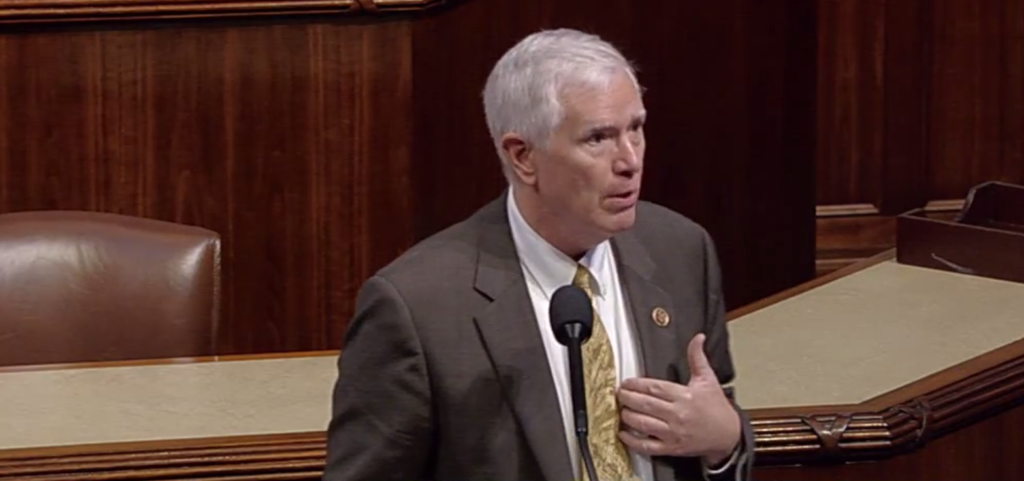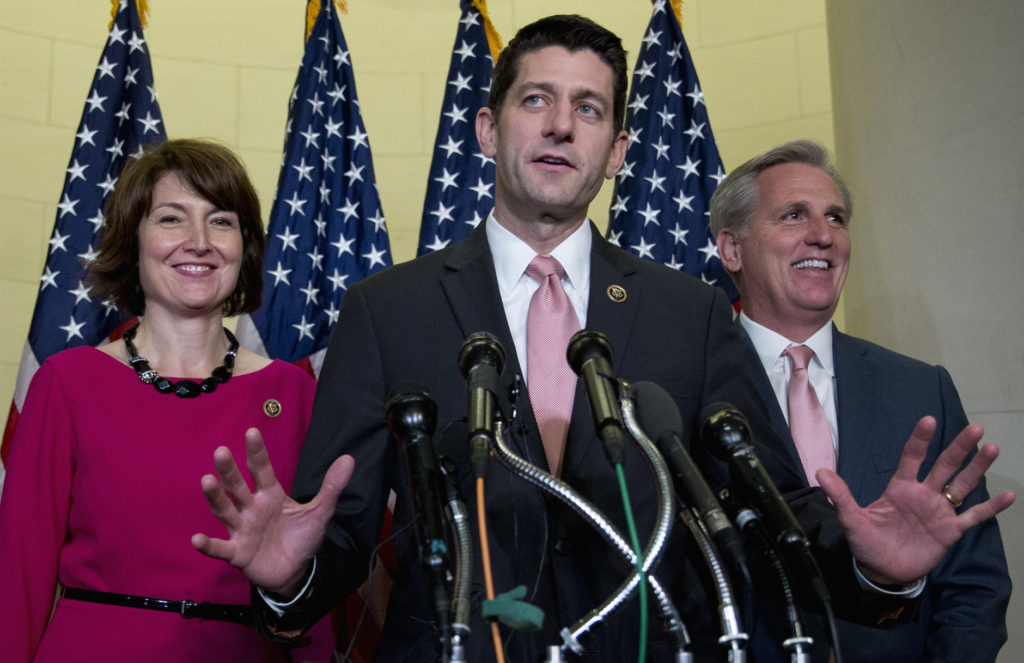House keeps armed forces operating, approves $578 billion

The full U.S. House of Representatives on Wednesday overwhelmingly approved the fiscal year 2017 defense appropriations bill, with the support of the entire Alabama delegation, with a bipartisan 371-48 vote. In total, the bill includes $577.9 billion in funding, which is an increase of $5.2 billion over last year’s funding levels. “The bill closely reflects the Defense Appropriations bill the House passed last summer, and is consistent with the final National Defense Authorization Act for fiscal year 2017,” according to a statement from the House Appropriations Committee. “The legislation funds critical national security needs, including military operations and readiness programs, as well as health and quality-of-life programs for our troops and military families.” The bill has several big wins for the Yellowhammer State, including funding for three more Littoral Combat Ships (LCS), which are built in part by Austal USA, which employs over 4,000 people at their shipyard in Mobile. It contains $8.2 billion for the procurement of 74 F-35 Joint Strike Fighters, and the Montgomery-based 187th Fighter Wing is on the short list for being assigned this next-generation fighter jet. The bill also contains a strong budget for Army Aviation, including $187 million for 28 Lakota helicopters, which are the primary aircraft used for training at the Army Aviation Center of Excellence at Fort Rucker. Funding for key R&D priorities for the Redstone Arsenal in Huntsville have aso been increased Additional bill highlights include: Rejects the Obama Administration’s proposed troop level reductions that would cut as many as 36,000 servicemen and women from the Armed Forces; Fully funds a 2.1% pay raise for the military personnel; Provides for 1,305,900 active-duty troops and 813,200 Guard and Reserve troops; Provides funding for an additional 1,000 active duty Army soldiers, 1,000 Army National Guard soldiers, 1,000 Army Reserve soldiers, and 1,000 active duty Marines; Funds ongoing military operations against ISIS and other terrorist organizations; Provides funding for 13 Navy ships, 74 F-35 aircraft, 61 UH-60 Blackhawk helicopters, and other key military programs; Includes funding to address readiness shortfalls and much-needed maintenance; and Boosts funding for research and development of new military technology. Here’s what the Alabama delegation had to say about their votes: Alabama 1st District U.S. Rep. Bradley Byrne: Ensuring our military men and women have the funding and resources to do their job is a fundamental responsibility of Congress. By passing the Defense Appropriations Act today, the House is further reaffirming our strong, bipartisan commitment to supporting the U.S. military. Working with my House and Senate colleagues, I am proud we were able to secure funding for the construction of three more Littoral Combat Ships. These ships are a key component of the Navy’s fleet, and the additional funding is vital to the future of the Austal shipyard in Mobile. I call on the Senate to quickly pass this funding bill and send it to President Trump’s desk for his signature. Alabama 2nd District U.S. Rep. Martha Roby: I am proud to represent a district that is home to both Fort Rucker and Maxwell-Gunter Air Force Base. I’m pleased to report that this bill contains a strong budget for Army Aviation, including $187 million for 28 Lakota helicopters. It also contains an increase of almost $450 million for the Air Force’s cyber security efforts. This Appropriations bill also contains funding for the procurement of 74 F-35 Joint Strike Fighters. The Montgomery-based 187th Fighter Wing is on the short list for being assigned this next-generation fighter jet, and our Alabama congressional delegation is working together to make the case to the Air Force why this special unit is an ideal fit. Alabama 5th District U.S. Rep. Mo Brooks: Importantly, H.R.1301 includes a 2.1% pay raise for our service men and women, reverses the Obama Administration’s drawdown of troops, and increases funding for Israeli Cooperative Programs by $455 million. In total, $600.7 million is provided for the Israeli Cooperative Programs, including $332 million for equipment procurement and $269 million for research and development. An additional $43 million is included for Israeli anti-tunneling efforts. I’m very pleased key priorities for the Redstone Arsenal community have been increased – notably high energy laser research, cybersecurity research for a variety of Army platforms and integration of systems, and the Army’s important continued investment in Future Vertical Lift. Check back, this article will be updated as more statements are available.
The week ahead for the U.S. House and Senate: Jan. 23-27, 2017

In the wake of Donald Trump‘s inauguration as the 45th President of the United States last Friday, both chambers are poised to respond to his first week decisions as they roll out of the Oval Office. U.S. House of Representatives Following a recess last week, the U.S. House of Representatives will resume legislative business on Monday and consider 11 several bills under Suspension of the Rules, including: H.R. 511 – Power And Security Systems (PASS) Act H.R. 587 – Fair RATES Act H.R. 590 – Advanced Nuclear Technology Development Act of 2017 H.R. 518 – EPS Improvement Act of 2017 H.R. 290 – Federal Communications Commission Process Reform Act of 2017 H.R. 423 – Anti-Spoofing Act of 2017 H.R. 588 – Securing Access to Networks in Disaster Act H.R. 555 – Amateur Radio Parity Act of 2017 H.R. 460 – Improving Rural Call Quality and Reliability Act of 2017 H.R. ___ – Federal Communications Commission Consolidated Reporting Act of 2017 H.R. 582 – Kari’s Law Act of 2017 On Tuesday, the House will consider H.R. 7: the No Taxpayer Funding for Abortion and Abortion Insurance Full Disclosure Act of 2017. An identical bill passed the House in the last Congress. The bill would broaden the existing language of the Hyde Amendment, banning the use of any federal funds to pay for abortions. Alabama co-sponsor(s): Rep. Mike Rogers (AL-03); Rep. Robert Aderholt (AL-04) The House is not scheduled to be in session for the remainder of the week, due to the annual Republican congressional retreat in Philadelphia, Penn. T U.S. Senate The U.S. Senate will primarily continue consideration of Trump’s Cabinet picks. Committee Schedule Monday, January 23, 2017 Senate Committees Secretary of State Nomination Senate Foreign Relations Full Committee Markup 4:30 p.m., SD-419 Tuesday, January 24, 2017 House Committees Committee Organization House Appropriations Full Committee Business Meeting 11:30 a.m. Committee Organization/ The Failures of Obamacare: Harmful Effects and Broken Promises House Budget Full Committee Hearing 10:15 a.m. Committee Organization House Education and the Workforce Full Committee Business Meeting 11:15 a.m. Committee Organization House Foreign Affairs Full Committee Business Meeting 10:30 a.m. Committee Organization House Judiciary Full Committee Business Meeting 11 a.m. Ongoing Intelligence Activities House Select Intelligence Full Committee Hearing 10 a.m. Committee Organization House Energy and Commerce Full Committee Business Meeting 1 p.m. Committee Organization House Oversight and Government Reform Full Committee Business Meeting 1 p.m. Subcommitteee Organization/Affordable Care Act Individual Mandate House Ways and Means – Subcommittee on Oversight Subcommittee Hearing 2 p.m. Senate Committees Defense Budget for FY2018 and Onwards Senate Armed Services Full Committee Hearing 9:30 a.m., SH-216 Committee Organization/Dr. Carson Nomination Senate Banking, Housing and Urban Affairs Full Committee Business Meeting 10 a.m., SD-538 Director of the Office of Management and Budget Nomination Senate Budget Full Committee Hearing 10:30 a.m., SD-608 Committee Organization/Pending Legislation Senate Commerce, Science and Transportation Full Committee Markup 10 a.m., SD-G50 Secretary of Health and Human Services Nomination Senate Finance Full Committee Hearing 10 a.m., SD-215 Attorney General Nomination/Committee Organization Senate Judiciary Full Committee Markup 10 a.m. Committee Organization/Secretary of Education Nomination Senate Health, Education, Labor and Pensions Full Committee Business Meeting 2:30 p.m., SD-430 Administrator of the Small Business Administration Nomination Senate Small Business and Entrepreneurship Full Committee Hearing 10:30 a.m., SR-428A Director of the Office of Management and Budget Nomination Senate Homeland Security and Governmental Affairs Full Committee Hearing 2:30 p.m., SD-342 Committee Organization Senate Veterans’ Affairs Full Committee Business Meeting 3 p.m.
Alabama delegation shuffles D.C. office locations during biennial office lottery

Following the November elections, Capitol Hill’s version of “The Hunger Games” began in Washington, D.C., where incumbent and incoming Members of Congress battled it out from prime office real estate in the House of Representatives. The “House Office Lottery” takes place every two years before the each new Congress begins in January. During the lottery, lawmakers vie for office spaces in one of the three House Office Buildings (HOB), Cannon, Longworth and Rayburn, where they’ll stay for the entirety of the two-year Congress. Those who end up with a coveted, large corner office may stay put for their entire Congressional careers; while other less lucky Members who end up in no-man’s land on the dimly lit fifth-floor, where elevators and people are scarce may opt to move the first chance the get during the next lottery. The process is simple, numbered black and white discs are placed into a wooden box. By seniority in Congress, then alphabetical order, each Members pulls disc out of the box. The lower the number on the disc, the better the position in line to choose an office. For some Members who have had a bad draw in the past and have been relegated to an extra small office, the a low number literally feels like winning the lottery. While there are no new Members joining the Alabama delegation this January, all of the incumbents won their re-elections, there will be a shuffle of office spaces among the delegation, with only three of the delegation’s seven Members opting to stay put during the 115th Congress. One of those taking advantage of the option to upgrade and move, is Alabama 3rd District U.S. Rep. Mike Rogers. Previously situated near the construction zone of oldest office building, Cannon HOB, Rogers was lucky enough to update to a space known for its large offices and superior views in the newest building, Rayburn HOB. “I have always said my door is open to the people of the Third Congressional District,” Rogers said. “I am excited about our new location in Washington and hope local citizens will continue to come by and visit when they are in our nation’s capital.” Here’s where you can find the Yellowhammer State reps should you visit Washington, D.C. next year: Alabama 1st District U.S. Rep. Bradley Byrne: Staying put Office location: 119 Cannon HOB Alabama 2nd District U.S. Rep. Martha Roby: Staying put Office location: 442 Cannon HOB Alabama 3rd District U.S. Rep. Mike Rogers: Moved Office location: 2184 Rayburn HOB Alabama 4th District U.S. Rep. Robert Aderholt: Staying put Office location: 235 Cannon HOB Alabama 5th District U.S. Rep. Mo Brooks: Moved Office location: 2400 Rayburn HOB Alabama 6th District U.S. Rep. Gary Palmer: Moved Office location: 330 Cannon HOB Alabama 7th District U.S. Rep. Terri Sewell: Moved Office location: 2201 Rayburn HOB
The week ahead for the U.S. House and Senate – Dec. 5-9, 2016

As President-elect Donald Trump continues to fill top positions in his cabinet this week, lawmakers look to begin wrapping up their legislative year by passing a stopgap spending bill in order keep the government running into 2017. Here’s what both chambers are working on this week: U.S. House of Representatives On Monday, the U.S. House of Representatives is in session and will consider several bills under Suspension of the Rules. A full list of bills can be found here. On Tuesday, the House is expected to continue with the consideration of several suspension bills. For the balance of the week, the House is expected to consider the following: H.R. 5143: Transparent Insurance Standards Act. The bill prohibits the United States from agreeing to any international insurance standards unless the government first publicly publishes the proposal, seeks public comment and reports to Congress on the impact of those standards on U.S. markets and consumers. It also prohibits the adoption of any international insurance capital standards until after the Federal Reserve issues domestic capital standards for insurance companies. Alabama co-sponsor(s): None WRDA: Negotiators from the House and Senate are expected to reach an agreement on a new Water Resources Development Act (WRDA; “wurd-uh”). Generally speaking, a WRDA is legislation that authorizes new water projects for construction by the Army Corps of Engineers. This final WRDA may also be the vehicle to help provide aid to Flint, Mich., whose drinking water system has been contaminated by lead. The bill would likely contain an authorization for that aid and actual funding may be packaged as part of the continuing resolution (CR) that the House will also consider this week. Alabama co-sponsor(s): N/A FY2017 CR: The House is expected to consider a continuing resolution (CR) that will extend current federal funding until sometime after March 2017. The final timeline of the CR is still being determined. Alabama co-sponsor(s): N/A The Senate is in session this week and expected to consider both the 21st Century Cures package and the NDAA that passed the House last week. The Senate will also likely consider both WRDA and the FY2017 CR after House consideration. U.S. Senate The Senate is in session this week and expected to consider both the 21st Century Cures package and the NDAA that passed the House last week. The Senate will also likely consider both WRDA and the FY2017 CR following House consideration.
House passes defense spending bill with Alabama delegation support

On Friday, the annual defense policy bill overwhelmingly passed the U.S. House of Representatives by a vote of 375 to 34. It now moves to the U.S. Senate for consideration next week. The 2017 National Defense Authorization Act (NDAA), funds the Pentagon and related military and intelligence operations through the next fiscal year. Specifically, the 2017 NDAA: Contains $619 billion total for national defense Provides $5.8 billion in supplemental funding for operations in Iraq, Afghanistan, and Europe Supplies an additional $3.2 billion for Readiness Stabilization Funding in an effort to stop additional reductions of the military Includes critical funding for Army helicopters $882 million for 52 AH-64 Apache helicopters $755 million for 36 new UH-60M multi-use Black Hawks for the Army and National Guard $126 million for the Improved Turbine Engine Program – a program essential to the development of a next generation engine for Blackhawk and Apache helicopter platforms Supports the Littoral Combat Ship program (LCS) by providing $1.1 million for two new Littoral Combat Ship Provides a 2.1% pay raise for our troops Maintains the current Basic Allowance for Housing (BAH), including for dual military families Improves access to health care for our troops and their families Prohibits the transfer of detainees at Guantanamo Bay to the United States, prohibits closure of the facility, and prohibits the transfer of the naval base to Cuba Provides the resources to combat Islamic extremists and to assist foreign security forces, such as the Kurds and Sunnis, to fight ISIS Supports our European allies to counter Russian aggression and funds the Israeli Cooperative Missile Defense programs Delivers improved technology to the warfighter faster While most chamber Democrats backed the legislation, despite the $619 billion price tag coming $3.2 billion dollars over White House requests, Alabama 7th District U.S. Rep. Terri Sewell chose not to vote. Here’s how the delegation voted and what they had to say about the bill: Alabama 1st District U.S. Rep. Bradley Byrne: This NDAA stops the drawdown of the military and authorizes critical funding for the operation and maintenance of our military. The bill authorizes important funding for training, helps rebuild outdated infrastructure, and ensures our military men and women have the munitions they need for ongoing operations. Alabama 2nd District U.S. Rep. Martha Roby: The Fiscal Year 2017 NDAA authorizes funding for the Department of Defense so that our service men and women have the tools and resources necessary to do their jobs. I’m pleased that the House took this critical step to support our troops and keep Americans safe. I look forward to working with the Trump Administration early next year to provide additional resources to fully fund unmet procurement needs, ensuring that our military – from the Generals making strategic decisions at the Pentagon to the warfighter on the front lines – have all that they need to defend our nation. Alabama 3rd District U.S. Rep. Mike Rogers: I am pleased the NDAA passed the House today with my strong support. This is a critical piece of legislation that helps take care of our brave men and women in uniform. This bill will strengthen our military, provide for vital installations like the Anniston Army Depot and authorize the funding needed to keep America safe. It will also give our service members the pay raise they deserve that they have not gotten in the past four years. Alabama 4th District U.S. Rep. Robert Aderholt: No comment made at this time. Alabama 5th District U.S. Rep. Mo Brooks: In recent years, budget cuts have slashed vital funding for training and equipment, creating a readiness crisis. The FY17 NDAA protects programs critical to ensuring our warfighters have the training and weaponry needed to protect America. Specifically, the legislation increases ground and aviation training and replenishes depleted munitions inventories. In addition, the FY17 NDAA fully fund’s Israel’s missile defense requirements and rejects cuts to TRICARE, Housing Allowances, and Commissary benefits for service members and their families. The FY17 NDAA also includes the largest pay raise for our troops in six years. Alabama 6th District U.S. Rep. Gary Palmer: Alabama 7th District U.S. Rep. Terri Sewell:
House passes $611 billion policy defense bill by wide margin

The Republican-led House on Friday overwhelmingly backed a $611 billion defense policy bill that rejects a number of President Barack Obama’s key proposals for managing the nation’s vast military enterprise. Lawmakers passed the legislative package, 375-34. The bill now goes to the Senate where a vote is expected early next week. The bill, crafted after weeks of talks between House and Senate negotiators, prohibits Obama from following through on his longstanding campaign pledge to close the prison at Guantanamo Bay, Cuba. The bill also bars the Pentagon from reducing the number of military bases even though senior U.S. defense officials said there is excess capacity, and it awards U.S. troops their largest pay raise in six years. Obama had recommended a smaller pay increase. The bill would prevent the Pentagon from forcing thousands of California National Guard troops to repay enlistment bonuses and benefits they received a decade after they signed up to serve in Iraq and Afghanistan. Soldiers would have to return a bonus only if a “preponderance of the evidence” shows they knew they weren’t eligible to receive the money. Even at $611 billion, the Republican chairman of the House Armed Services Committee lamented that more money is needed in the defense budget to restock the U.S. arsenal worn down by 15 years of conflict. Rep. Mac Thornberry of Texas said he is hopeful President-elect Donald Trump, who pledged during the campaign to spend more on the military, will ask Congress early next year to boost fiscal year 2017 military spending even further. During his 2008 bid for president, Obama pledged to close the detention facility at Guantanamo, which he called a recruiting tool for extremist groups. But Republicans and a number of Democrats repeatedly thwarted his goal over the ensuing years, arguing the prison was badly needed for housing suspected terrorists. The ban on closing the prison also includes a prohibition on moving Guantanamo detainees to secure facilities in the U.S. Trump has not only pledged to keep Guantanamo open, he said during the campaign that he wants to “load it up with some bad dudes.” The defense legislation also authorizes a 2.1 percent pay raise for the troops – a half-percentage point higher than the Pentagon requested in its budget presentation. The Republican chairman of the Armed Services Committee, Sen. John McCain of Arizona, said it’s the largest military pay increase since 2010. The White House Office of Management and Budget objected to the larger raise, telling lawmakers earlier this year that the lower amount would save $336 million this fiscal year and $2.2 billion through 2021. A bigger increase, the budget office said, would upset the careful balance between competitive pay and acquiring cutting-edge equipment and training. The bill blocks the Pentagon’s planned reductions in the number of active-duty troops by prohibiting the Army from falling below 476,000 active-duty soldiers – 16,000 more than Obama’s defense budget had proposed. The bill also adds 7,000 service members to the Air Force and Marine Corps. House and Senate negotiators dropped a House plan to shift $18 billion from the emergency wartime spending account to pay for additional weapons and combat gear the Pentagon didn’t include in its budget request. They elected instead to boost the wartime account, which isn’t constrained by mandatory budget limits, by $3.2 billion to help halt a decline in the military’s ability to respond to global threats. The decision may have been motivated by Trump’s assurances that he would increase defense spending dramatically, allowing the armed forces to add tens of thousands more troops and acquire new weapons. The defense bill contains $5.8 billion in additional war-related funding Obama requested last month primarily for operations in Iraq, Syria and Afghanistan. That includes $2.5 billion to maintain elevated U.S. troop levels of 8,400 in Afghanistan as announced over the summer. About $383 million would pay for air strikes against Islamic State militants. Lawmakers avoided wading more deeply into social policy issues by stripping two contentious provisions from the bill. One, opposed by Democrats, would have allowed federal contractors to discriminate against workers on the basis of sexual or gender orientation. Another, opposed by Republicans, would have required for the first time in U.S. history that young women sign up for a potential military draft. The Obama administration on Thursday declared its support for requiring women to register for the military draft, a symbolic but significant shift that reflects the U.S. military’s evolution from a male-dominated force to one seeking to incorporate women at all levels. Republished with permission of The Associated Press.
Mo Brooks supports Donald Trump’s voter fraud assertions from House floor

Alabama 5th District U.S. Rep. Mo Brooks took to the House floor Wednesday to support President-elect Donald Trump’s assertion of voter fraud in the recent presidential election and challenged “left-wing media” efforts to silence “serious discussion” on the problem of non-citizens illegally voting in U.S. elections. “Mr. Speaker, President-elect Donald Trump opined in a tweet on November 27 that ‘In addition to winning the Electoral College in a landslide, I won the popular vote if you deduct the millions of people who voted illegally.’ As would be expected, a circus of left-wing, media pundits immediately pounced on President-elect Trump’s opinion in an effort to silence serious discussion of the noncitizen voter fraud problem,” Brooks said from the floor. Brooks went on to describe the voter fraud challenges he believed his home-state of Alabama faced in the most recent Presidential elections. Brooks continued, “In January of 2016, the United States Election Assistance Commission approved Alabama’s proof of citizenship voter registration requirement. The League of Women Voters then challenged proof of citizenship laws in the Washington, D.C., federal courts. In an astonishing ruling in September of 2016, a mere six weeks before the election, the United States Court of Appeals for the District of Columbia entered a preliminary injunction that barred Alabama, Kansas, Georgia, and, indirectly, any other state, from requiring proof of citizenship to register to vote.” “Now what does all of this mean?” Brooks pondered. “It means that, right before the presidential election, federal courts created a massive legal hole that empowers non-citizens to register to vote and, once registered, to vote in America’s elections with impunity, thereby undermining and diluting the vote of lawful Americans and striking at the very heart of our democracy.” It remains to be seen whether or not Trump’s team will provide substantial evidence of the alleged voter fraud. Watched Brooks’ entire speech below:
Reckoning for Nancy Pelosi as House Democrats vote for leader

Minority Leader Nancy Pelosi faced a reckoning from fellow House Democrats on Wednesday as frustrated lawmakers tried to oust her from the leadership post she’s held for over a decade. The 76-year-old California Democrat, known as a master vote counter, was expected to beat back the challenge from Ohio Rep Tim Ryan as Democrats met behind closed doors. But she was forced to promise changes to the caucus to answer complaints from lawmakers fed up with being shut out of the upper ranks of leadership, especially in the wake of a devastating election that installed a GOP monopoly over Congress and the White House. A half-dozen Democrats were slated to deliver testimonials to Pelosi in nominating speeches, but the disenchantment was evident. “I think Tim Ryan would be a great leader. He’s a new generation and I think he would appeal to a lot of millennials and young people in this country,” Rep. Steve Lynch, D-Mass., said as he headed into the session. “He brings a certain excitement and also a bit of common sense from Youngstown, Ohio.” “Our base is working people and we’ve got to talk about that. We’ve got to tell working people in this country that we care about them,” Lynch said. Leadership elections were originally scheduled to be held before Thanksgiving but were delayed to give Democrats more time to discuss and process the election results and consider a path forward. Many are discouraged after losing the White House and making smaller than expected gains in both chambers of Congress. “I believe we must do more than simply paper over the cracks,” said Rep. Ruben Gallego of Arizona, one of a handful of House Democrats to endorse Ryan. “We can’t just say the right things – we must take concrete steps to move our party in the right direction.” The 76-year-old Pelosi has been promising some changes to assuage concerns in her caucus, including adding a member of the freshmen class to her leadership team. But her proposals do little to ensure new blood at the very top or change the seniority system that has key committees led by lawmakers in their 80s at a moment when the party needs to be defending President Barack Obama‘s health care law and other initiatives. Nonetheless Pelosi projected confidence heading into the vote. Known for her vote-counting skills, the Californian asserted she had support of two-thirds of Democrats locked up. “Leader Pelosi is honored to receive the overwhelming support of her colleagues,” said spokesman Drew Hammill. “That so many members are so enthusiastic and eager to take active roles in the caucus is music to her ears.” Other top leadership posts are uncontested, with Steny Hoyer of Maryland expected to stay in the No. 2 job of whip, and Jim Clyburn of South Carolina in the No. 3 position of assistant leader. The position of conference chairman is term-limited, and Xavier Becerra of California is expected to be replaced by Joe Crowley of New York. There is a contest for the position of conference vice chair between two California Democrats, Linda Sanchez and Barbara Lee. Either would become the first minority woman in leadership. On the eve of the House leadership elections, 85-year-old Rep. Sander Levin, the top Democrat on the House Ways and Means Committee, said he will not seek re-election to the panel post, clearing the way for a younger lawmaker to move into the spot on the powerful committee. Becerra and Rep. Richard Neal of Massachusetts told House Democrats they are interested in the position. Republicans are on track to hold at least 240 seats in the House next year. Democrats, who had high hopes of significant gains in the election, picked up just six seats on Election Day earlier this month and remain in the minority with 194 seats. Republished with permission of the Associated Press.
Martha Roby: America must keep the upper hand with Iran

Recently the U.S. House of Representatives took up and overwhelmingly passed the Iran Sanctions Extension Act, which reauthorizes for another ten years the economic penalties the United States has used to deter the Islamic Republic of Iran from further developing its unconventional weapons program, including ballistic missiles and supporting terrorism. Originally enacted in 1996, these sanctions have been some of the most meaningful tools in bringing Iran and its ambitious weapons program to heel. Extending them for another ten years is the right decision, and I was proud to vote in favor of the bill’s passage. Also last week, House Speaker Paul Ryan sent a letter to President Obama urging him to abandon any plans for new concessions to Iran during his final days in office. The letter asked that President Obama “take no further actions designed to bolster international investment in Iran, or otherwise change or alter the existing sanctions regime within international organizations through the use of waivers or through administrative actions…” The House vote and Speaker Ryan’s letter comes amid reports that the Obama Administration plans to take additional steps to aide Iran’s economy in attempt to save the president’s legacy nuclear agreement. You may remember that last year, despite significant opposition from Republicans and Democrats alike in Congress, President Obama negotiated an executive nuclear agreement with Iran. I said at the time that the executive agreement was a bad deal because negotiators failed to achieve their very own stated objectives on inspections, verifications, and sanctions. Then in January, the Administration released a $1.7 billion payment to Iran coinciding with the release of five Americans held prisoner by Iran, in violation of longstanding U.S. policy meant to protect our national security interests. I’m afraid the Obama Administration’s baffling behavior toward Iran is weakening what was once a very strong hand in dealing with this rouge nation. However, since President Obama’s Iran nuclear deal is an executive agreement and not a treaty, it is subject for review in the next presidential administration. President-elect Donald Trump said repeatedly throughout his campaign that he believes the Obama Administration negotiated badly, and he strongly suggested that he will pull the U.S. out of the nuclear agreement. Like everyone else who has been engaged in this issue, I am eager to see how President-elect Trump deals with the situation. My colleagues and I in Congress certainly stand willing to support policies that strengthen our hand towards Iran, as evidenced by the overwhelming bi-partisan vote in favor of the Iran Sanctions Extension Act (ISA). Of course, this is just one of many decisions facing President-elect Trump and his incoming administration as the transition of executive power moves forward. I hope you’ll join me in praying for wisdom and guidance for the president-elect and all those who advise him at this time of great consequence for our country. ••• Martha Roby represents Alabama’s 2nd Congressional District. She lives in Montgomery, Alabama with her husband Riley and their two children.
Chance of Dem challenge to Nancy Pelosi grows

Reeling from an electoral shellacking, discontented House Democrats on Thursday signaled they may challenge Rep. Nancy Pelosi as minority leader. Republicans focused on wrapping up a short-term spending bill into early next year when an all-GOP government will rule. Ohio Rep. Tim Ryan said he would decide soon on whether to run against Pelosi in party elections later this month. “I think there’s a lot of anxiety in the caucus and a lot of people want some change,” said the 43-year-old congressman. “I would think it has to be at the top “ Pelosi, well-known for her ability to count votes, said in announcing her candidacy on Wednesday that she has the backing of two-thirds of the caucus. Ryan dismissed that claim as disgruntled Democrats clamor for change after losing the White House and remaining in the minority in the House and Senate with minimal gains. In a closed-door session, Rep. Kathleen Rice, D-N.Y., said she told her colleagues that “if we don’t, as a party, have our leaders accept responsibility for where we are, we can’t move forward and get to the point where our message is going to resonate with voters.” Pelosi, 76, is a survivor who enjoys enormous respect and goodwill among most Democrats, even as many of her closest allies have left Congress. She has managed to maintain unity within the diverse flock of House Democrats and is an unparalleled fundraiser for them, collecting more than $100 million in the past cycle alone. She was crucial in ensuring President Barack Obama‘s health care overhaul became law in 2010. Even in the minority under Obama, Pelosi has been a savvy negotiator with GOP leaders when Democratic votes were needed to advance legislation. The first female speaker of the House, Pelosi has led House Democrats since 2002. “When somebody challenges you, your supporters turn out, both internally in the caucus and in the country,” Pelosi told reporters at her weekly news conference. Angry lawmakers expressed their frustration in the closed-door session, and some grew angrier after Pelosi left the room to hold her weekly news conference, according to those who attended the session and spoke on condition of anonymity because they weren’t authorized to publicly discuss the session. In the meeting, Rep. Ruben Gallego, D-Ariz., said he issued a challenge in the caucus “that anybody who is running for any position of leadership needs to come back and explain to us how we’re going to be able to survive one, the Trump years, but two, to not have the same excuse we have every two years where there’s some external factor that somehow causes us to not gain the seats that we need.” The elections had been scheduled for Thursday but were postponed until Nov. 30. On the budget front, House Republican leaders said President-elect Donald Trump wants a short-term spending bill to keep the government running through March of next year. The current stopgap spending bill runs out in less than a month, on Dec. 9. House and Senate negotiators are working on a bill they could pass before leaving for the holidays. House Republicans met Thursday behind closed doors with Vice President-elect Mike Pence. Speaker Paul Ryan told them the new administration prefers a four-month extension of spending. Such a move would let the Republican-controlled government boost military spending while making deep cuts in domestic programs next year. Republished with permission of the Associated Press.
House GOP nominates Paul Ryan as speaker, with Donald Trump’s support

Speaker Paul Ryan unanimously won his GOP colleagues’ votes on Tuesday for another term at the helm of the House. He told fellow Republicans he had President-elect Donald Trump‘s support, and heralded “the dawn of a new, unified Republican government.” “It feels really good to say that actually,” Ryan told reporters. “This will be a government focused on turning President-elect Trump’s victory into real progress for the American people.” While victory was the GOP unifier, Democrats were verging on disarray. House Democrats abruptly announced Tuesday that they were delaying their own leadership elections set for Thursday until Nov. 30 to give lawmakers more time to process disastrous election results. It’s not clear whether the election delay might morph into a real challenge to Minority Leader Nancy Pelosi, D-Calif. She has led House Democrats for more than 12 years and has consolidated support with strong fundraising and an ability to deliver votes, but there’s long been grumbling from Democrats who say new leadership is needed at the top. As for Ryan, the Wisconsin Republican still has to win a floor vote for speaker in January, when all members of the House will cast ballots, including Democrats. But he secured the nomination at a closed-door GOP conference vote Tuesday afternoon with the strong backing of his fellow House Republicans, even though a few conservative dissenters pushed unsuccessfully to delay the balloting. Those grumblings of dissent could hardly be heard over the buzz of enthusiasm as House Republicans convened for their first regular conference meeting since Trump won the presidential election. Even though a number of House Republicans, including Ryan, had opposed Trump or were critical along the way, most said they’re now firmly on board and prepared to try to enact Trump’s agenda on immigration, infrastructure, energy and jobs. Republicans also backed California’s Kevin McCarthy for majority leader and Steve Scalise of Louisiana for the No. 3 job of House whip. Lawmakers trooped out of their morning meeting in the basement of the Capitol smiling, pledging quick action to roll back President Barack Obama‘s accomplishments and clutching red “Make America Great Again” hats. “That was a nice fun touch. Now here’s my problem: Every member wants it autographed,” said GOP Rep. Chris Collins of New York, one of Trump’s earliest congressional backers, who has been tapped as congressional liaison to the transition team. “I’m going to have to say, ‘President-elect Trump, bring out your Sharpie, we’ve got to do a lot of autographing.’” During the meeting, Ryan told colleagues that he’d spoken Tuesday morning with Vice President-elect Mike Pence, who said that he and Trump “are very supportive of the leadership team and are looking forward to working with them,” said Rep. Cynthia Lummis, R-Wyo. Coming after a campaign full of very public GOP infighting and clashes between Ryan and Trump, it’s “a validating moment,” said Lummis, a member of the hard-right Freedom Caucus. Republicans had widely been forecast to lose the Senate and suffer major losses in the House, but instead lost just two Senate seats and a half-dozen in the House, giving them full-scale control of Washington for the first time in a decade. For Democrats, ill-feeling was only magnified in defeat. “Everything’s not good. Business as usual is not gonna work,” said Rep. Ruben Gallego, D-Ariz. “This is about our constituents. Saying we have heard you. We have clearly missed the mark with regard to legislation and messaging.” For Republicans, though, it was heady times after they’ve spent years watching their legislative priorities get stymied, if not by Democrats in the Senate then by Obama’s veto pen. The situation also brings stark risks since Republicans will have no one to blame but themselves if they can’t deliver on Trump’s promises. Already GOP leaders and Trump himself have been shifting on some of his pledges, including the border wall and a full repeal of Obama’s health care law. Ryan refused to answer directly when Congress would go along with Trump’s plan to spend $1 trillion on infrastructure. “These are things we’re working on. … The point is Donald Trump wants job,” he said. Ryan also avoided a direct answer on Trump’s appointment of Stephen Bannon to a senior White House role. Bannon’s Breitbart website, which embraces white nationalist currents, has frequently singled out Ryan himself for attacks. “Look, I would just simply say that the president is going to be judged on his results,” Ryan said. “I’m not looking backwards, I’m looking forward.” In the Senate, Republicans and Democrats were meeting separately Wednesday to pick their leadership teams. Senate Majority Leader Mitch McConnell, R-Ky., is keeping his job in a chamber that Republicans will control by 52-48. Minority Leader Harry Reid, D-Nev., is retiring after a 30-year Senate career and will be replaced by Sen. Chuck Schumer, D-N.Y. Republished with permission of the Associated Press.
House GOP seems ready to renew Paul Ryan, other leaders for 2017

House Republicans seem ready to keep Speaker Paul Ryan and other leaders in their posts as a GOP exultant over Donald Trump‘s White House triumph prepares to push year-end bills through the lame-duck Congress and focus on a bolder agenda next year. As lawmakers returned for a post-election session, House Republicans were meeting privately Tuesday to pick their leadership team for the next two years, when the GOP will have unfettered White House and congressional control for the first time since 2006. Ryan, R-Wis., seemed on track to being nominated to keep his job, with the full GOP-led House formally electing the speaker when the new Congress convenes Jan. 3. Ryan faced dissension from hard-right conservatives wondering if he’ll be aggressive enough and Trump backers irked by his refusal to campaign for the GOP presidential nominee. But lawmakers from across the party’s spectrum predicted Ryan would prevail, aided by Trump’s victory and the president-elect’s selection of Republican Party Chairman Reince Priebus, a Ryan friend from Wisconsin, as White House chief of staff. Priebus’ selection is “a perfect indication of our new president’s desire to get things done,” Ryan said Monday on WBEL radio’s “The Stan Milan Show.” Asked about people nervous about the election results, Ryan said, “I’d tell people just to relax. Things are going to be fine.” But some Republicans weren’t. “I’m not going to support anybody in leadership until they tell me how things are going to change the next two years,” said Rep. Raul Labrador, R-Idaho, a member of the tea party oriented House Freedom Caucus that helped push Speaker John Boehner into early retirement last year. Labrador said he expected Ryan to win the majority of Republicans needed Tuesday to be nominated. He said “the rub comes” Jan. 3, when Ryan will need 218 votes – a majority of the full House – to be speaker and avoid a damaging setback to a career path that many think includes a presidential run. With four races undecided, Republicans will likely have 241 seats next year. Democrats are certain to back their own leader, meaning no more than 23 Republicans could desert him. Another Freedom Caucus member, Rep. Mark Meadows, R-N.C., said Trump’s victory helped Ryan “more out of the necessity of having to hit the ground running on issues that are important, that were campaigned on, than anything else.” Rep. Lou Barletta, R-Pa., an early Trump supporter not in the Freedom Caucus, said he’d not decided whether to back Ryan. He said he preferred delaying the leadership vote because Republicans needed time to discuss campaign “divisions,” a seeming reference to their differences over Trump. Before adjourning for the year, lawmakers who have failed to make a dent in the year’s spending legislation will have to find a way to approve something so federal agencies won’t shut down on Dec. 9. Leaders also want bills approved speeding government drug approval and financing water projects, including money to help Flint, Michigan, clean up its lead-poisoned water supply. The House voted on minor bills Monday and the Senate was returning Tuesday. Lawmakers leave at week’s end for Thanksgiving break. Republicans plan a 2017 agenda headlined by repealing and rewriting Obama’s health care law, cutting taxes and curbing federal regulations. Senate Republicans and Democrats were meeting separately Wednesday to pick their leadership teams. Senate Majority Leader Mitch McConnell, R-Ky., is keeping his job in a chamber that Republicans will control by 52-48. Minority Leader Harry Reid, D-Nev., is retiring after a 30-year Senate career and seems certain to be replaced by Sen. Chuck Schumer, D-N.Y. House Democrats, led by Minority Leader Nancy Pelosi, D-Calif., plan leadership decisions Thursday. More than two dozen junior Democrats wanted a delay, saying the party needs time to digest last week’s election flop, losing the White House and gaining a disappointing handful of congressional seats. On Tuesday the House is expected to approve a bill renewing a decades-old Iran sanctions law, which supporters say would let the U.S. punish Tehran should the country fail to live up to the terms of the landmark nuclear deal. Republished with permission of the Associated Press.


